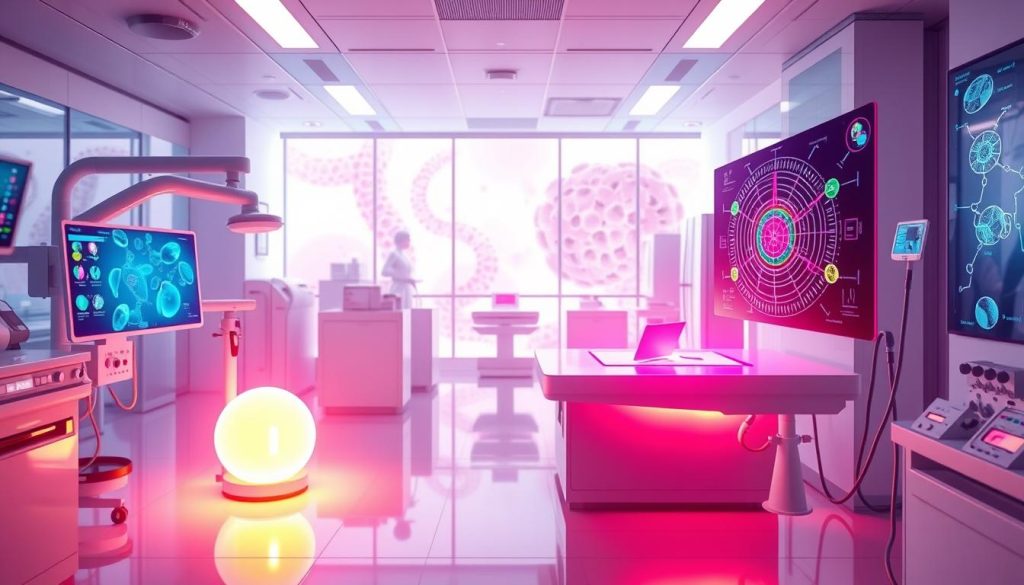Medical science is making big strides in treating breast cancer. This brings hope to those fighting this disease. New treatments are being developed, aiming to make cancer less of a threat to women’s health.
Every person’s battle with breast cancer is different. So, doctors are focusing on treatments that fit each person’s needs. This approach is key to improving care.
Science is not just making old treatments better. It’s also exploring new ways to fight cancer. This guide will take you through the wide range of breast cancer treatments. From traditional surgeries to cutting-edge therapies, we’ll explore it all.
Key Takeaways
- The spectrum of breast cancer therapy options caters to a range of patient needs and situations.
- Innovative breast cancer therapies are at the forefront of enhancing survival and improving quality of life.
- Personalization of treatment plans is pivotal in the context of modern breast cancer care.
- Emerging treatments offer promising avenues for those seeking alternatives to traditional methodologies.
- Progress in medical research is instrumental in developing new and more effective breast cancer therapies.
- The integration of advanced technologies paves the way for novel therapeutic approaches in cancer treatment.
Understanding Breast Cancer and Its Impact
Breast cancer is more than one disease; it’s a complex mix of subtypes. Each one needs a special holistic approach to breast cancer treatment. It’s key for doctors and patients to understand this to make the best choices in breast cancer treatments.
This disease starts in the milk ducts or lobules. It can then spread to other parts of the body, known as metastasis. The main types are ductal carcinoma in situ, invasive ductal carcinoma, and invasive lobular carcinoma. Each has different symptoms and levels of severity.
Diagnosis often involves multiple stages including physical exams, mammography, and biopsies, ultimately leading to a staging determination that helps in selecting an appropriate treatment strategy.
Breast cancer affects many lives worldwide every year. It shapes public health policies and sparks awareness campaigns in various groups. These efforts highlight the need to fully grasp breast cancer to offer tailored and effective treatments.
- Initial detection and the accuracy of staging
- Choice of breast cancer treatments including surgery, radiation, and systemic therapies
- Long-term management and surveillance for recurrence
- Inclusion of a holistic approach to breast cancer treatment in recovery plans
The conversation around breast cancer is evolving. It’s moving from fear to informed action. This shift empowers patients to face their diagnosis with knowledge and support. It also helps blend traditional treatments with new ones, enhancing results and quality of life.
The Evolution of Breast Cancer Treatments
The journey from old surgical methods to the latest breast cancer treatments is a big leap in medical science. This change has made treatments more accurate and improved life for millions with breast cancer.
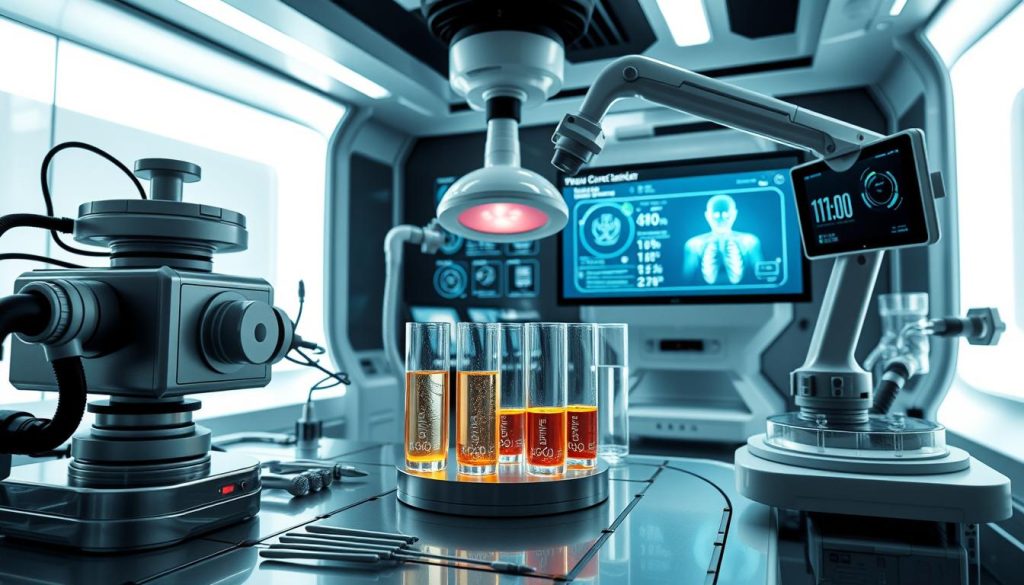
At first, breast cancer treatment was mainly surgery, causing a lot of harm to patients. The radical mastectomy by William Halsted in the late 19th century was a big step, but it was also debated. As we learned more about cancer, our treatment methods changed too.
Now, we use less invasive surgeries like lumpectomies. We also use targeted radiation and chemotherapy. These methods aim to remove tumors without harming healthy tissue.
- Introduction of hormone therapies that target specific hormones which fuel cancer growth.
- Advances in genetic testing that help predict cancer risks and personalize treatment plans.
- Development of advanced breast cancer treatments like immunotherapy.
New technologies have led to advanced breast cancer treatments that are gentler but more effective. Tools like robotic surgery and real-time imaging during operations have made surgeries more successful.
The use of personalized medicine in breast cancer treatment is another big step. It allows for treatments that match a patient’s tumor, improving results.
The constant evolution of breast cancer treatments through history not only reflects the advancements in medical technology and understanding but also a shifting paradigm towards patient-centered care. This progression brings us closer to turning cancer from a fatal illness into a manageable condition.
The mix of old knowledge and new discoveries keeps improving cancer care. The latest breast cancer treatments are getting better and more available. We’re working towards a future where breast cancer can be fully defeated.
Established Surgical Options for Breast Cancer
Surgery is a key part of treating breast cancer. It’s important to know the different surgical options. This helps find the right breast cancer therapy options for each person’s health.
Lumpectomy and mastectomy are two common surgeries for breast cancer. Each surgery has its own use, benefits, and things to think about. These are important for making a personalized breast cancer treatment plan.
- Lumpectomy: This is often used for smaller tumors. It removes the tumor and some healthy tissue around it. It’s good because it keeps most of the breast tissue, which is great for early-stage cancers.
- Mastectomy: This surgery removes one or both breasts. It’s usually recommended for bigger tumors, multiple tumors, or high genetic risk. It’s more invasive but lowers cancer coming back risk.
After these surgeries, reconstructive surgery might be needed to make the breast look like it did before. This is important for many patients’ mental health. It’s a big part of personalized breast cancer treatment.
“Choosing the right surgical option is a decisive step in effective breast cancer management and heavily influences both the clinical outcome and the patient’s quality of life.”
Using these surgeries with other treatments like chemotherapy, radiation, or hormonal therapy is key. This approach fights the disease from many sides. It gives patients the best chance for a good outcome.
Every patient’s journey is different. Thanks to medical science, we’re moving towards more personalized breast cancer treatment plans. These plans aim to treat the cancer well and meet each patient’s health needs and wishes. This makes the treatment experience better for everyone.
Chemotherapy and Radiation: Traditional Pillars of Therapy
Chemotherapy and radiation are key in fighting breast cancer. They have changed over time but are still very important. They often work together with newer treatments to help patients.
The Mechanism of Chemotherapy in Targeting Cancer Cells
Chemotherapy attacks fast-growing cancer cells and kills them. But, it also harms healthy cells that grow quickly. This leads to side effects. Chemotherapy can make tumors smaller and kill cancer cells that have spread.
Radiation Therapy: Techniques and Effectiveness
Radiation therapy focuses on specific areas with cancer. This helps protect healthy tissues. New technologies like IMRT and proton therapy make treatment more precise. This can lead to better survival rates and fewer cancer returns.
- Breast Conservation Therapy: This combines lumpectomy with radiation to save as much breast tissue as possible.
- Adjuvant Radiation: Used after surgery to kill any remaining cancer cells and lower the chance of cancer coming back.
- Palliative Radiation: Helps relieve symptoms in advanced cancer cases, improving life quality.
Chemotherapy and radiation are still key in treating breast cancer. They are part of complex treatment plans that include newer, targeted therapies.
Hormonal Treatments and Targeted Drug Therapies
The world of breast cancer treatment has changed a lot with hormonal treatments and targeted drug therapies. It’s important to know about these options. They help find innovative breast cancer therapies that fit each patient’s unique needs.
Hormonal treatments stop cancer cells from getting the hormones they need to grow. They are often used in breast cancers that are hormone receptor-positive. These treatments can lower the chance of cancer coming back and slow it down.
- Tamoxifen for premenopausal women
- Aromatase inhibitors for postmenopausal women
- Suppression of ovarian function in younger women
Targeted drug therapies like monoclonal antibodies and kinase inhibitors have changed treatment options. They aim at specific parts of cancer cells without harming normal cells. This can lead to fewer side effects than traditional chemotherapy.
Targeted therapies are key in moving towards personalized medicine in oncology. They offer treatments made just for a patient’s genetic makeup.
This move towards personalized and targeted treatments is a big step forward. It means better, more precise care for breast cancer patients. It meets the high standards of today’s medicine and what patients want from their healthcare.
With more research and development, breast cancer treatment is getting even better. These improvements are crucial for better survival rates and quality of life for those fighting cancer. They show the progress towards more innovative breast cancer therapies.
Immunotherapy: A Promising Avenue in Breast Cancer Treatment
Immunotherapy is a game-changer in breast cancer care. It uses the body’s immune system to fight cancer. This method offers new hope for those with advanced breast cancer.
Understanding How Immunotherapy Works Against Cancer
Immunotherapy is a standout in advanced breast cancer treatments. It helps the immune system find and fight cancer cells. It works by boosting immune cells or breaking down cancer’s hiding tricks.
Key tools include checkpoint inhibitors and monoclonal antibodies. These target cancer growth pathways.
Recent Advances in Breast Cancer Immunotherapy
There’s been a big leap in breast cancer treatment with immunotherapy. CAR T-cell therapy is a big player. It reprograms T-cells to attack cancer cells aggressively.
This treatment is being tested in breast cancer trials. It shows great promise. Research into combining immunotherapy with other treatments is also underway. This could lead to better results and longer-lasting remissions.
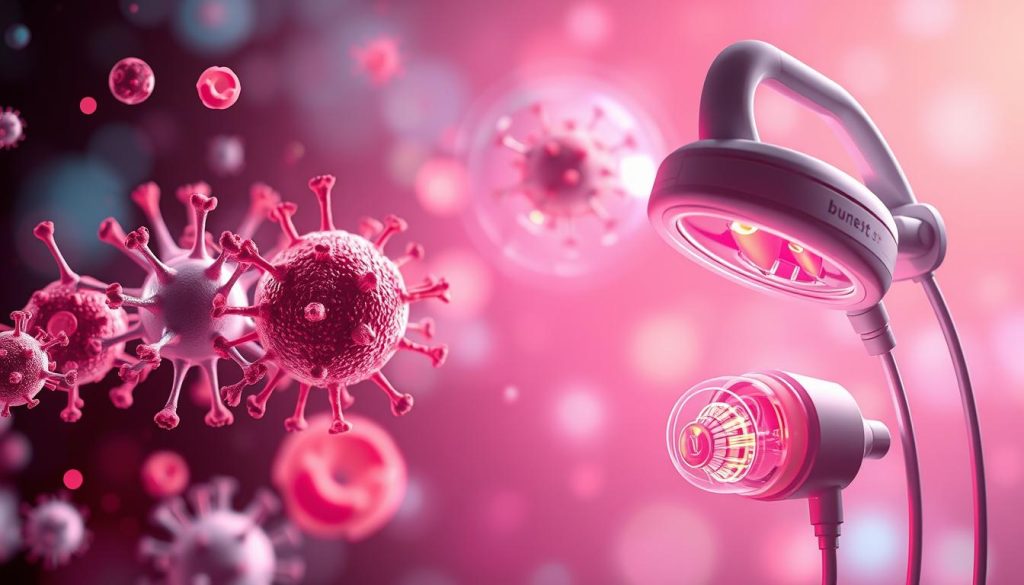
Immunotherapy is becoming a key part of breast cancer treatment. It’s all about personalized care, tailored to each patient. As research continues, immunotherapy’s role in breast cancer treatment grows. It’s a big step towards more targeted and effective care.
Personalized Breast Cancer Treatment: Genetic Profiling and Tailored Approaches
The world of oncology is moving forward fast. Personalized breast cancer treatment is becoming more important. Doctors use genetic profiling to create treatment plans that fit each patient’s unique genetic makeup. This approach makes treatments more effective and reduces side effects, showing a big step forward in latest breast cancer treatments.
The Role of Genomics in Personalized Cancer Care
Genomic testing is key in the early stages of personalized treatment. It helps doctors find unique mutations in cancer cells. They then create therapies that target these specific issues. This precision boosts the chances of successful treatment and gives hope to those with aggressive or rare breast cancers.
From Lab to Clinic: Personalized Therapies in Practice
The path from finding genetic clues to treating patients is complex. It involves teamwork between geneticists, oncologists, and pharmacologists. This collaboration ensures every step, from genetic screening to treatment, is done with great care. Breakthroughs in personalized breast cancer treatment often go straight from the lab to helping patients, offering them new, advanced treatments.
As breast cancer treatment keeps evolving with these latest breast cancer treatments, personalized care offers a brighter future for patients. It means each patient gets a treatment plan that’s as unique as their diagnosis.
Breast Cancer Treatments
The world of breast cancer treatments has grown a lot. Now, we use a holistic approach to breast cancer treatment. This method helps both the body and mind of patients. It fights the tumor and improves life quality during and after treatment.

It’s key to know about all the treatments out there. Patients and doctors need to work together. They create a treatment plan that fits each person’s needs.
- Surgical Procedures: These are often the first line of attack, including lumpectomy and mastectomy, based on the tumor’s size and stage.
- Chemotherapy: Used to kill cancer cells, chemotherapy is often used before surgery (neoadjuvant chemotherapy) to shrink tumors or after (adjuvant chemotherapy) to eliminate any remaining cancerous cells.
- Radiation Therapy: This treatment is essential for destroying cancer cells in the breast, chest wall, or axilla (armpit area) after surgery, reducing the risk of recurrence.
- Hormone Therapy: For cancers that are hormone receptor-positive, medications can help block the body’s natural hormones (estrogen and progesterone) that can promote cancer growth.
- Targeted Drug Therapy: Unlike chemotherapy, which broadly targets all rapidly dividing cells, targeted therapy aims at specific genetic changes in cancer cells.
- Immunotherapy: Harnesses the power of the body’s immune system to recognize and combat cancer cells more effectively.
Using a holistic approach to breast cancer treatment means thinking about how each treatment affects the body, spirit, and emotional health. This might include adding nutritional counseling, physical therapy, and psychological support to standard treatments. It ensures patients get the best care possible.
This integrated method towards breast cancer treatments not only aims at eradicating the disease but also at enhancing the overall well-being of the individual, offering a more balanced approach to recovery.
Advanced Breast Cancer Treatments: Emerging Technologies
The medical field is always moving forward. New advanced breast cancer treatments and innovative breast cancer therapies are being developed. These advancements aim to improve patient outcomes and reduce side effects. This means better quality of life for those going through treatment.
Two exciting technologies leading this change are nanotechnology and electrochemotherapy.
Nanotechnology in Targeted Cancer Treatments
Nanotechnology is changing the game in advanced breast cancer treatments. It uses tiny particles to carry drugs straight to cancer cells. This makes treatments more effective and safer for healthy tissues.
This targeted approach cuts down on the usual side effects of chemotherapy. It’s a big step forward in cancer care.
Electrochemotherapy: Zapping Tumors with Precision
Electrochemotherapy is another new technology. It combines electrical pulses with chemotherapy to get drugs into cancer cells better. This means lower doses of chemotherapy can still kill cancer cells effectively.
This shows a big leap in innovative breast cancer therapies. As researchers keep working on these methods, they could soon be used more widely. This could start a new era in cancer treatment.
- Targeted drug delivery via nanoparticles.
- Reduced chemotherapy dosage with enhanced effectiveness.
- Minimization of side effects, improving patient quality of life.
These technologies are not just medical advancements. They also give hope to those fighting advanced breast cancer. They promise a future where managing such diseases is more efficient and precise.
The Best Breast Cancer Treatment Centers: What Sets Them Apart?
Finding the best breast cancer treatment centers is more than just about the latest tech. It’s about caring for the whole person, leading in research, and making treatment plans just for you. At these top places, patients get top-notch medical care and support that really helps them get better.
“Our mission is to offer not only advanced breast cancer treatments but also a nurturing environment that supports our patients’ overall wellbeing.”
So, what makes these centers stand out? Let’s dive in:
- Multidisciplinary Teams: They have doctors, surgeons, and more, all experts in breast cancer.
- Customized Patient Care: Plans are made just for you, making treatment better and more comfortable.
- Cutting-Edge Research: They’re always in on new trials, giving patients access to the newest advanced breast cancer treatments.
- State-of-the-Art Facilities: They have the latest tech for diagnosis and treatment, ensuring the best care.
These centers also make a big impact in the fight against cancer. They help shape studies and practices around the world, setting new standards in cancer care.
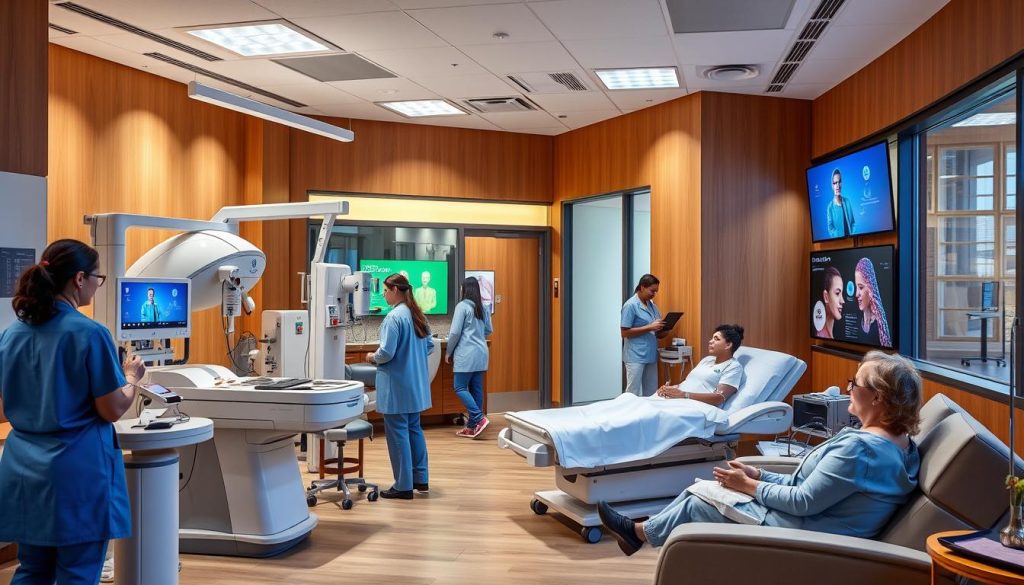
In short, the best breast cancer treatment centers do more than just treat. They create a healing environment that helps patients not just survive, but thrive after treatment.
Supportive Care in Breast Cancer: Enhancing Quality of Life During Treatment
When we talk about breast cancer therapy options, we must focus on more than just treatment success. We also need to think about how these treatments affect the patient’s quality of life. Supportive care in breast cancer is key. It aims to reduce symptoms, manage pain, and keep patients comfortable and positive during treatment.
Pain Management and Palliative Care: Essential Components
Effective pain management and comprehensive palliative care are crucial in supportive care for breast cancer. These parts help manage pain and other symptoms well. This makes patients more comfortable:
- Pain Management: Pain relief plans are made just for each patient. They use medicine and other methods.
- Palliative Care: It’s not just about physical symptoms. It also helps with emotional and spiritual needs. This supports patients and their families.
Nutritional and Psychological Support for Breast Cancer Patients
Nutritional counseling and psychological support are also important in the holistic approach to breast cancer treatment. These services help patients deal with the physical and mental challenges of breast cancer:
- Nutritional Support: Dietitians in oncology help with nutrition. They focus on supporting the immune system and managing side effects.
- Psychological Support: Mental health experts help with anxiety, depression, and fear. This ensures patients can better cope with their diagnosis and treatment.
Adding these supportive care aspects is vital. It improves clinical outcomes and mental health for breast cancer patients. It also boosts their quality of life during and after treatment. This shows the importance of treating the whole patient, not just the disease.
Innovative Breast Cancer Therapies: A Glimpse into the Future
The world of cancer research is always moving forward. Scientists are working hard to find innovative breast cancer therapies. They aim to save more lives and make treatments better for patients.
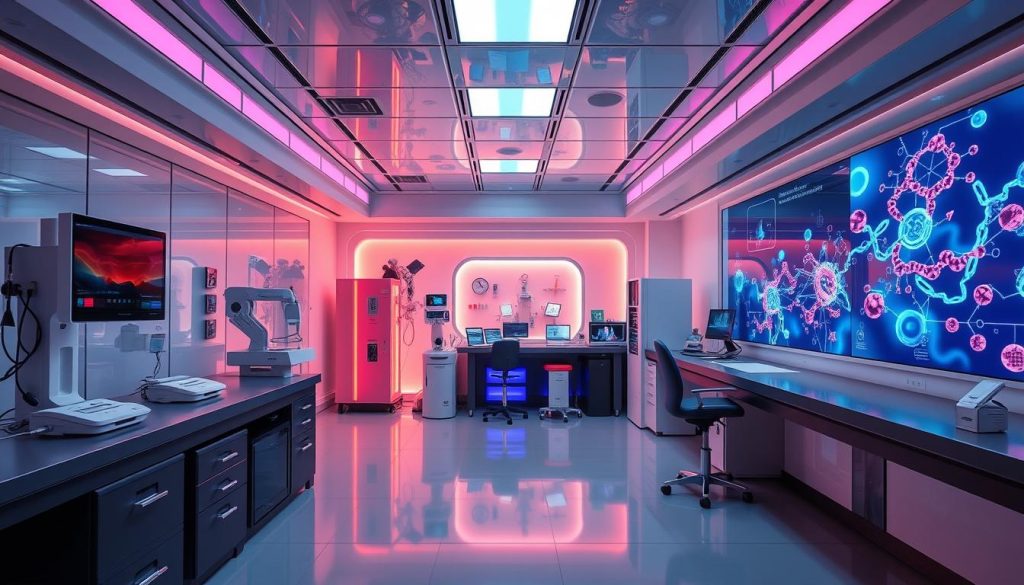
New drugs target cancer cells directly, protecting healthy tissues. Artificial intelligence helps predict how well treatments will work. This means doctors can tailor plans to fit each patient’s needs.
- Enhanced precision medicine technologies that map the genetic profile of individual tumors, leading to highly tailored treatment strategies.
- Breakthroughs in immunotherapy, including new monoclonal antibodies and checkpoint inhibitors that help the immune system recognize and fight cancer cells more effectively.
- The integration of digital health tools to monitor patient health in real-time, optimizing treatment schedules and dosages based on dynamic data.
New treatments are not just about better drugs. They’re about creating a more complete care plan. This includes advanced tests and ongoing monitoring to help patients and improve their care.
“The future of breast cancer treatment is inherently tied to the advancements in technology and our understanding of the disease at a molecular level. Every new therapy brings hope of turning breast cancer into a manageable condition rather than a fatal disease.”
As scientists find new ways to fight cancer, the outlook is brighter than ever. This brings hope to everyone involved. It also sets a new standard for cancer care, focusing on precision, effectiveness, and personalization.
Latest Breast Cancer Treatments Under Clinical Trials
The field of breast cancer treatment is always getting better. New clinical trials are leading to therapies that could change lives. The latest breast cancer treatments being tested show great promise. They could change how we fight this common disease.
Investigational Drugs and Their Potential Impact
New advanced breast cancer treatments include drugs that target cancer more precisely. These drugs are made to match the unique traits of each cancer. For example, new inhibitors are being tested to stop cancer growth more effectively than old treatments.
New Frontiers in Vaccines for Breast Cancer
Vaccines to prevent or treat breast cancer are becoming more popular. Unlike usual vaccines, cancer vaccines aim to boost the immune system against cancer. Researchers are working on vaccines to stop cancer from coming back after other treatments. These vaccines are a new and exciting area in fighting breast cancer.
As doctors keep working on these latest breast cancer treatments, there’s hope for better options soon. These clinical trials could lead to safer, more effective treatments for people everywhere.
A Holistic Approach to Breast Cancer Treatment: Integrating Alternative Therapies
Using a holistic approach to breast cancer treatment can make therapy better. It mixes traditional medicine with alternative therapies. This mix helps treat cancer and improve overall health.
Therapies like acupuncture, yoga, meditation, and herbal supplements are gaining attention. They support personalized breast cancer treatment plans. These methods help manage symptoms and lessen side effects of treatment.
- Acupuncture: Often used to alleviate pain and help manage chemotherapy-induced nausea and vomiting.
- Yoga: Enhances flexibility, strengthens the body, and reduces stress through deep breathing and gentle movement.
- Meditation: Helps in reducing stress and improving the psychological health of patients by promoting a calm and peaceful mindset.
- Herbal Supplements: Used to boost the immune system and support overall health, though they should always be taken under the guidance of a healthcare provider to avoid interactions with conventional medications.
Adding these therapies to treatment helps with physical symptoms. It also improves emotional and psychological health. This ensures a more complete care plan.
“Embracing a holistic approach in medical care allows for personalized treatments that cater to individual patient needs, ultimately aiming to enhance the quality of life.”
This approach leads to more personalized breast cancer treatment. It’s tailored to each patient’s needs. This can improve treatment results and patient happiness.
Navigating Breast Cancer Care: Empowering Patients and Caregivers
The journey through breast cancer treatments is complex and emotionally challenging. It’s crucial for patients and caregivers to make informed decisions about treatment options. Empowerment comes from understanding these options, asking the right questions, and seeking second opinions.
A collaborative approach is key to effective, personalized care. This approach focuses on the patient’s needs and goals.
Managing treatment costs can be overwhelming. It’s important for patients and caregivers to know about financial help, support groups, and educational resources. This information can make care decisions more organized and focused on the patient’s health.
Advocacy is vital in breast cancer treatment. Patients and caregivers should fight for the best care. This includes questioning plans, exploring clinical trials, and seeking new treatments.
Knowledge is a powerful tool on this journey. It helps those affected by breast cancer move forward with hope and determination.
FAQ
Q: What are the different breast cancer therapy options available?
A: There are many ways to treat breast cancer. Options include surgery, like lumpectomy or mastectomy. Also, chemotherapy, radiation, and hormonal therapy are used. Targeted drug therapy, immunotherapy, and new tech like nanotechnology are also available.
Q: How have breast cancer treatments evolved over time?
A: Treatments have changed a lot. They’ve moved from simple surgeries to advanced therapies. This change is thanks to new tech and medical knowledge. Now, treatments are more personalized and holistic.
Q: What constitutes a holistic approach to breast cancer treatment?
A: A holistic approach treats the whole person. It includes physical, emotional, and mental care. This means managing pain, nutrition, and mental health. It also includes things like acupuncture and yoga.
Q: What are some of the latest breast cancer treatments currently under investigation?
A: New treatments are being tested. These include drugs with new ways of working. Also, immunotherapy and cancer vaccines are being studied to fight breast cancer better.
Q: What are personalized breast cancer treatments and how are they determined?
A: Personalized treatments are made just for you. They’re based on your cancer’s genetic profile. These treatments target your cancer’s genes and may include special drugs and immunotherapies.
Q: What are some innovative breast cancer therapies currently in use?
A: New therapies include targeted drugs and immunotherapy. These treatments focus on specific cancer cells. They also include advanced radiation techniques.
Q: What sets the best breast cancer treatment centers apart?
A: Top centers have expert teams and personalized care. They also do cutting-edge research and have the latest facilities. Their support services help patients live better and longer.
Q: How can patients and caregivers empower themselves in navigating breast cancer care?
A: Patients and caregivers can take charge. Seek second opinions and learn about new treatments. Understand your diagnosis and treatment options. Manage costs and advocate for care that focuses on you. Use support resources to make informed choices.
Q: Can alternative therapies be integrated with conventional breast cancer treatments?
A: Yes, alternative therapies can be used with standard treatments. Options like acupuncture and yoga can help reduce side effects. They also improve well-being and support holistic care.
Q: What is the role of genomics in breast cancer treatment?
A: Genomics is key in treating breast cancer. It helps find genetic mutations specific to your cancer. This info guides more precise and effective treatments.












